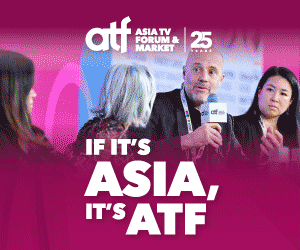The first question iflix asks online is: Are you human?. The second is: What’s your phone number (please include country code)?
That’s all you need – to be human and to have a working mobile phone – to sign up for a 14-day free trial of Asia’s newest online SVOD service.
If, that is, you are in Malaysia or the Philippines, where the service launched at the end of May. It’s that easy.
Getting out is as easy. No long-term contracts if you don’t want them. A 20% discount – from RM10/US$3 a month to RM96/US$26 for the year – if you sign up for 12 months.
After the free trial, you either sign up or you sign out. There’s no mix of free and paid. No confusion over what you’re getting for free and what you have to pay for. Nothing to irritate you. No friction. No more than one decision to make – do I want it or not?
iflix’s line is: “no strings attached, no hidden catches and no contracts”.
In the first 24-hours live, 11,000 people had signed up for the trial. The first sign-up was Mark Britt, the iflix Group’s Kuala Lumpur-based chief executive.
In three months, iflix will have enough user data to shift from the ‘what we think you will watch’ trial/launch mode to a pure data-driven offering based on what customers are actually watching. Britt says 60% of his acquisition budget will be released in this post-launch phase, earmarked for giving people content they’ve already shown they have a taste for. In five years, iflix plans to have 30 million paying customers. Britt is a passionate advocate of video-based entertainment. “We all watch twice as much as our parents,” he said the day after the service went live.
“And our children will watch twice as much as us”. That golden age of content is nothing that mega global creators like Disney/ABC, CBS Studios, Warner Brothers, Sony Pictures Television, don’t already know. But it’s still nice to hear it from one of the region’s great disruptors, especially one who says iflix is a data business first and a content business second. Ultimately, though, the consumer benefits. Data-driven insights will drive the evolution of the service, B...
The first question iflix asks online is: Are you human?. The second is: What’s your phone number (please include country code)?
That’s all you need – to be human and to have a working mobile phone – to sign up for a 14-day free trial of Asia’s newest online SVOD service.
If, that is, you are in Malaysia or the Philippines, where the service launched at the end of May. It’s that easy.
Getting out is as easy. No long-term contracts if you don’t want them. A 20% discount – from RM10/US$3 a month to RM96/US$26 for the year – if you sign up for 12 months.
After the free trial, you either sign up or you sign out. There’s no mix of free and paid. No confusion over what you’re getting for free and what you have to pay for. Nothing to irritate you. No friction. No more than one decision to make – do I want it or not?
iflix’s line is: “no strings attached, no hidden catches and no contracts”.
In the first 24-hours live, 11,000 people had signed up for the trial. The first sign-up was Mark Britt, the iflix Group’s Kuala Lumpur-based chief executive.
In three months, iflix will have enough user data to shift from the ‘what we think you will watch’ trial/launch mode to a pure data-driven offering based on what customers are actually watching. Britt says 60% of his acquisition budget will be released in this post-launch phase, earmarked for giving people content they’ve already shown they have a taste for. In five years, iflix plans to have 30 million paying customers. Britt is a passionate advocate of video-based entertainment. “We all watch twice as much as our parents,” he said the day after the service went live.
“And our children will watch twice as much as us”. That golden age of content is nothing that mega global creators like Disney/ABC, CBS Studios, Warner Brothers, Sony Pictures Television, don’t already know. But it’s still nice to hear it from one of the region’s great disruptors, especially one who says iflix is a data business first and a content business second. Ultimately, though, the consumer benefits. Data-driven insights will drive the evolution of the service, Britt says. In a space so easy to exit, every sliver of data that adds a competitive advantage clearly counts.
The ability to use every tool known to humankind will be massively tested in the next few years as a squillion hopefuls pile into digital delivery for Asia.
Right now, Asia has more than 100 online platforms (that we could count) offering, at an average of 10,000 hours each, maybe a million hours of professionally produced video content online. And that’s excluding regional services such as Viki, multi-channel networks such as Brand New Media (BNM) and Commercialize TV, and the mother of all video platforms, YouTube. At least one more telco-driven platform will be making its way across Asia this year. That we know of. There are very likely to be more as well-established legacy broadcasters and shiny eager new players see and try to exploit the opportunity in delivering absolute consumer choice.
How many of them will make it? Impossible to tell. What we can say is that right now, today, what’s being promised looks pretty much like content heaven. My devil – today – is that, even if I can answer yes to iflix’s ‘are you human’ question, I don’t have a Malaysian or Philippines’ mobile number. - Janine Stein
This article first appeared as the Editor's Note in ContentAsia Issue 2, 2015, published in June 2015



















